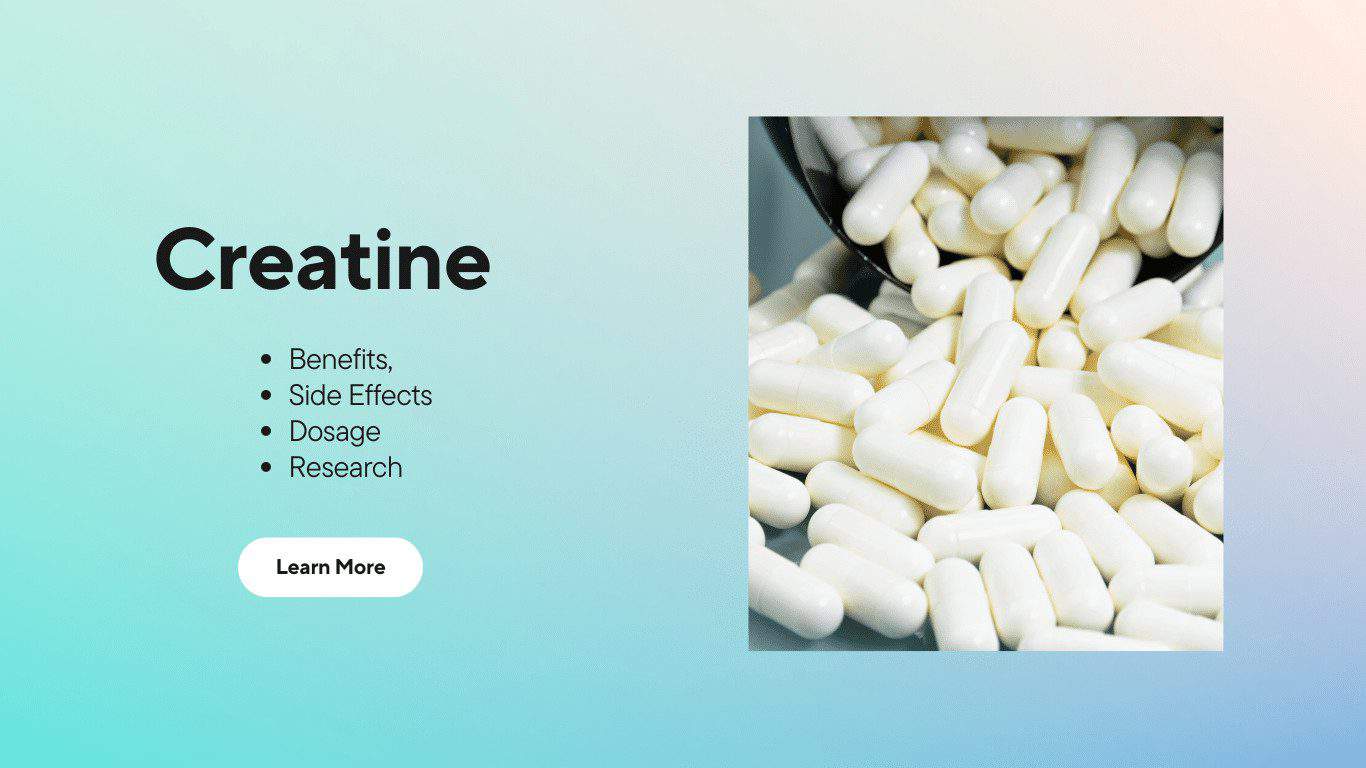Creatine: Benefits, Side Effects, And How To Use It Safely

Table of Contents
Benefits of Creatine: Boosting Performance and Strength
Creatine monohydrate, the most common and researched form of creatine, is a naturally occurring compound found in small amounts in meat and fish. Its primary function is to increase the production of adenosine triphosphate (ATP), the body's main energy currency. This enhanced ATP production fuels muscle contractions, leading to a range of performance benefits.
Enhanced Muscle Growth and Strength
Creatine significantly enhances muscle protein synthesis, the process by which your body builds and repairs muscle tissue. This leads to increased lean muscle mass and improved strength gains. Studies consistently demonstrate creatine's effectiveness in boosting strength training results.
- A meta-analysis of multiple studies published in the Journal of the International Society of Sports Nutrition showed that creatine supplementation significantly increased strength and power output in participants.
- Creatine's anabolic effects are further enhanced when combined with resistance training, maximizing its muscle-building potential.
- The increased ATP availability allows for more intense and prolonged workouts, leading to greater hypertrophy (muscle growth).
Improved Athletic Performance
The enhanced energy production from creatine isn't limited to the gym; it significantly improves athletic performance in various high-intensity activities. Creatine supplementation is particularly beneficial for:
- Sprinting: Creatine improves sprint performance by increasing the rate of ATP regeneration.
- Weightlifting: It allows for more repetitions and heavier weights lifted during weight training sessions.
- High-Intensity Interval Training (HIIT): Creatine enhances performance during short bursts of intense exercise followed by brief recovery periods.
- Other anaerobic exercises: Any activity relying on short, powerful bursts of energy benefits from creatine supplementation.
Studies have shown improvements in power output, increased repetitions performed, and reduced recovery time in athletes using creatine supplements. This translates to better performance in various sports, including soccer, basketball, hockey, and more.
Cognitive Benefits of Creatine
While primarily known for its physical benefits, emerging research suggests that creatine may also have positive effects on brain health and cognitive function. Creatine's ability to increase ATP production in brain cells may lead to:
- Improved memory
- Enhanced focus and concentration
- Increased learning capacity
However, the research in this area is still relatively limited, and more studies are needed to confirm and clarify these cognitive benefits. While promising, it's important to approach these findings with a degree of caution.
Potential Side Effects of Creatine: Addressing Concerns
While generally considered safe, creatine supplementation can cause some side effects in certain individuals. It's crucial to understand these potential effects to manage expectations and use creatine responsibly.
Common Side Effects
The most frequently reported side effects of creatine are generally mild and temporary:
- Water retention: Creatine draws water into muscle cells, leading to a temporary increase in weight.
- Weight gain: The water retention and increased muscle mass contribute to overall weight gain.
- Gastrointestinal issues: Some individuals experience mild stomach cramps, bloating, or diarrhea, particularly during the initial loading phase.
These side effects are usually manageable and often subside after the body adjusts to the supplement.
Rare Side Effects and Precautions
While serious side effects are rare, it's important to be aware of them and take necessary precautions:
- Kidney issues: In individuals with pre-existing kidney problems, creatine may exacerbate existing conditions.
- Muscle cramps: Though uncommon, some experience increased muscle cramps.
It is crucial to consult a doctor before starting creatine supplementation, especially if you have any pre-existing health conditions, particularly kidney problems. Creatine is generally considered safe for healthy individuals when used as directed.
How to Use Creatine Safely and Effectively
To maximize the benefits and minimize the risk of side effects, proper usage of creatine is essential.
Choosing the Right Creatine Supplement
Creatine monohydrate is the most researched and widely recommended form of creatine. When choosing a supplement, look for reputable brands that undergo third-party testing to ensure purity and quality.
- Check for certifications like Informed Sport or USP Verified.
- Read reviews and compare different brands.
Optimal Creatine Dosage and Cycling
A common approach involves a loading phase followed by a maintenance phase:
- Loading phase: Consume 20 grams of creatine per day, divided into 4-5 doses, for 5-7 days.
- Maintenance phase: After the loading phase, reduce the daily dosage to 3-5 grams to maintain saturation levels.
Creatine cycling (periods of use followed by periods of discontinuation) is a common practice, but its necessity remains debated. Consult your healthcare provider for personalized advice on dosage and cycling strategies.
Creatine and Hydration
Adequate hydration is crucial when taking creatine. Because creatine increases water retention in muscles, maintaining proper fluid balance is important to prevent potential side effects.
- Drink plenty of water throughout the day.
- Listen to your body and increase water intake if you feel thirsty.
Conclusion: Making Informed Decisions About Creatine
Creatine offers significant benefits for boosting muscle growth, strength, and athletic performance. While generally safe, it's essential to understand potential side effects and use it responsibly. Remember to choose high-quality supplements, follow recommended dosages, and stay adequately hydrated. Always consult your healthcare professional before starting any new supplement regimen, especially if you have pre-existing health conditions. Start your journey towards enhanced performance with the right creatine supplementation strategy today! Learn more about maximizing the benefits of creatine and incorporate it safely into your fitness routine!

Featured Posts
-
 Padres Lineup Tatis Returns Campusano Called Up Amidst Rain Delay
May 16, 2025
Padres Lineup Tatis Returns Campusano Called Up Amidst Rain Delay
May 16, 2025 -
 Everton Vina 0 0 Coquimbo Unido Resultado Resumen Y Goles
May 16, 2025
Everton Vina 0 0 Coquimbo Unido Resultado Resumen Y Goles
May 16, 2025 -
 La Fires Reality Tv Star Exposes Alleged Landlord Price Gouging
May 16, 2025
La Fires Reality Tv Star Exposes Alleged Landlord Price Gouging
May 16, 2025 -
 A Max Muncy Meets Dodgers Max Muncy An Imagined Conversation
May 16, 2025
A Max Muncy Meets Dodgers Max Muncy An Imagined Conversation
May 16, 2025 -
 Shohei Ohtani Why He Dedicated His Home Run Celebration To A Teammate
May 16, 2025
Shohei Ohtani Why He Dedicated His Home Run Celebration To A Teammate
May 16, 2025
